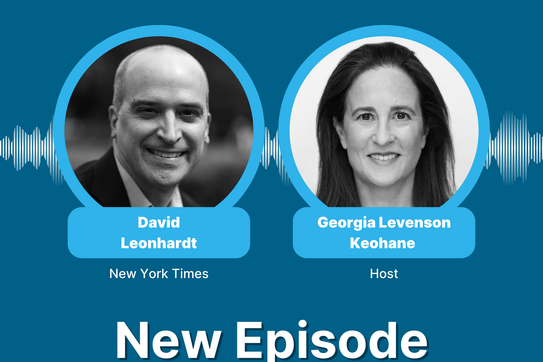In this episode of Capital for Good we speak with David Leonhardt, senior writer at the New York Times, where he writes its flagship newsletter, “The Morning,” and author of the important new book, Ours Was the Shining Future: The Story of the American Dream. At the Times Leonhardt has been Washington bureau chief, op-ed columnist, staff writer for the Magazine, and founding editor of “The Upshot.” Winner of the Pulitzer Prize for commentary in 2011, Leonhardt is one of the country’s most insightful thinkers and analysts.
We begin the conversation with some of Leonhardt’s own origin story: his family’s experience with the American Dream, including that of his grandfather who fled the antisemitic persecution of wartime Europe for the United States, married, and started life in the US in 1940 on the cusp of a long period of prosperity and opportunity — one, too, of terrible discrimination, racism, sexism — but a society that, for most Americans, would deliver on the promise of the American Dream “that life gets better over time.” “I feel a real gratitude for this country, not by any means blind to its great faults,” Leonhardt says, and expresses deep concern that our collective sense of optimism about the future has faded for so many as progress — on earnings, health and wellbeing, life expectancy – has slowed “to a crawl for most Americans,” while income and wealth inequality have soared.
We discuss Leonhardt’s belief that capitalism “works better than any alternative we’ve found… but only a certain type of capitalism”: one that acknowledges that the market is a good and strong force “with consistent shortcomings” that, unchecked by government interventions, can produce significant inequality, or global challenges like climate change. Leonhardt describes how a positive “democratic capitalism” thrived in the post war period for a number of reasons, among them the rise of organized labor that significantly reduced inequality and increased material living standards for lower- and middle-income Americans, and a culture of business leadership championed by executives who believed they were “trustees of the common welfare,” stewards of a kind of high wage, low inequality capitalism that shared the goal with government and labor of creating “a more prosperous America to lead the world.” Leonhardt notes that this era also saw significant government investment in public goods — basic science and technology research (that was then taken up by the private sector), physical infrastructure (i.e., roads and railways), social infrastructure (i.e., education) — with the foresight and political will to use “some of today’s resources to make life better tomorrow.” Today, Leonhardt laments, we have reverted to a kind of “rough and tumble” capitalism with massive declines in union membership and power, a more self-interested corporate culture, and a stagnation that comes from decades of underinvestment.
We end our discussion on a note of optimism, “not that we are going to fix our problems,” Leonhardt says, “but that we can fix our problems.” He believes that the decline of the American Dream over the past half century can be reversed, and that the dream can be restored by a strong and diverse grassroots political movement dedicated “to protecting that dream” and improving the living standards of most Americans. Leonhardt cites any number of unlikely successes in our history of social progress — on the political left and labor – that have been achieved through grassroots organizing and coalition building. He is confident, or at least hopeful, “the future can be different from the past.”
Mentioned in this episode:
- Ours Was the Shining Future: The Story of the American Dream
- Longer Commutes, Shorter Lives: The Costs of Not Investing in America, (The New York Times, 2023)
- The Hard Truth About Immigration, (The Atlantic, 2023)
